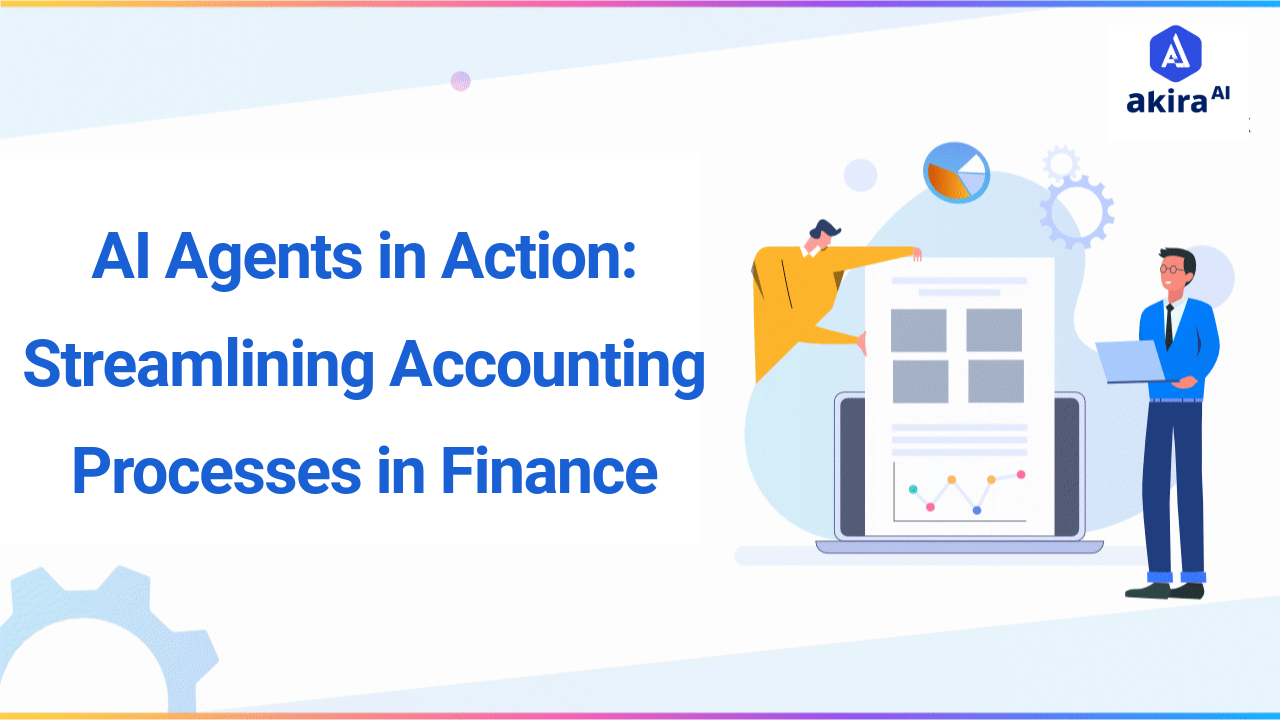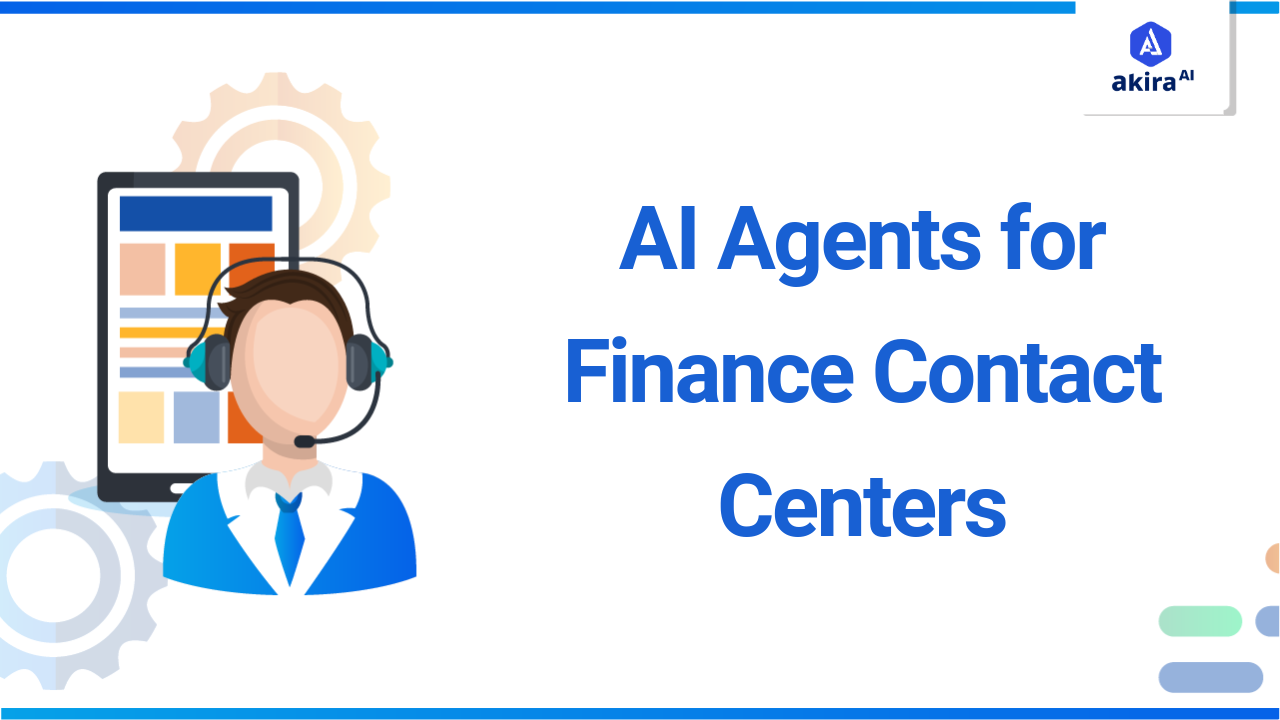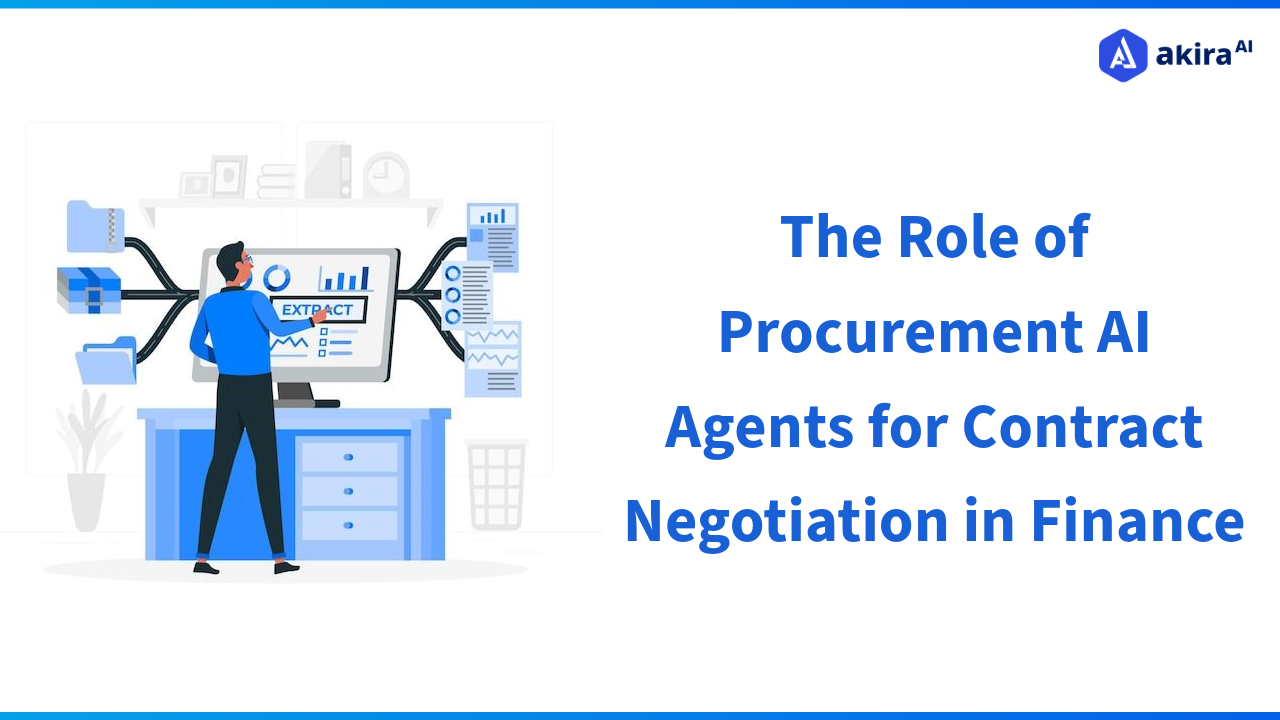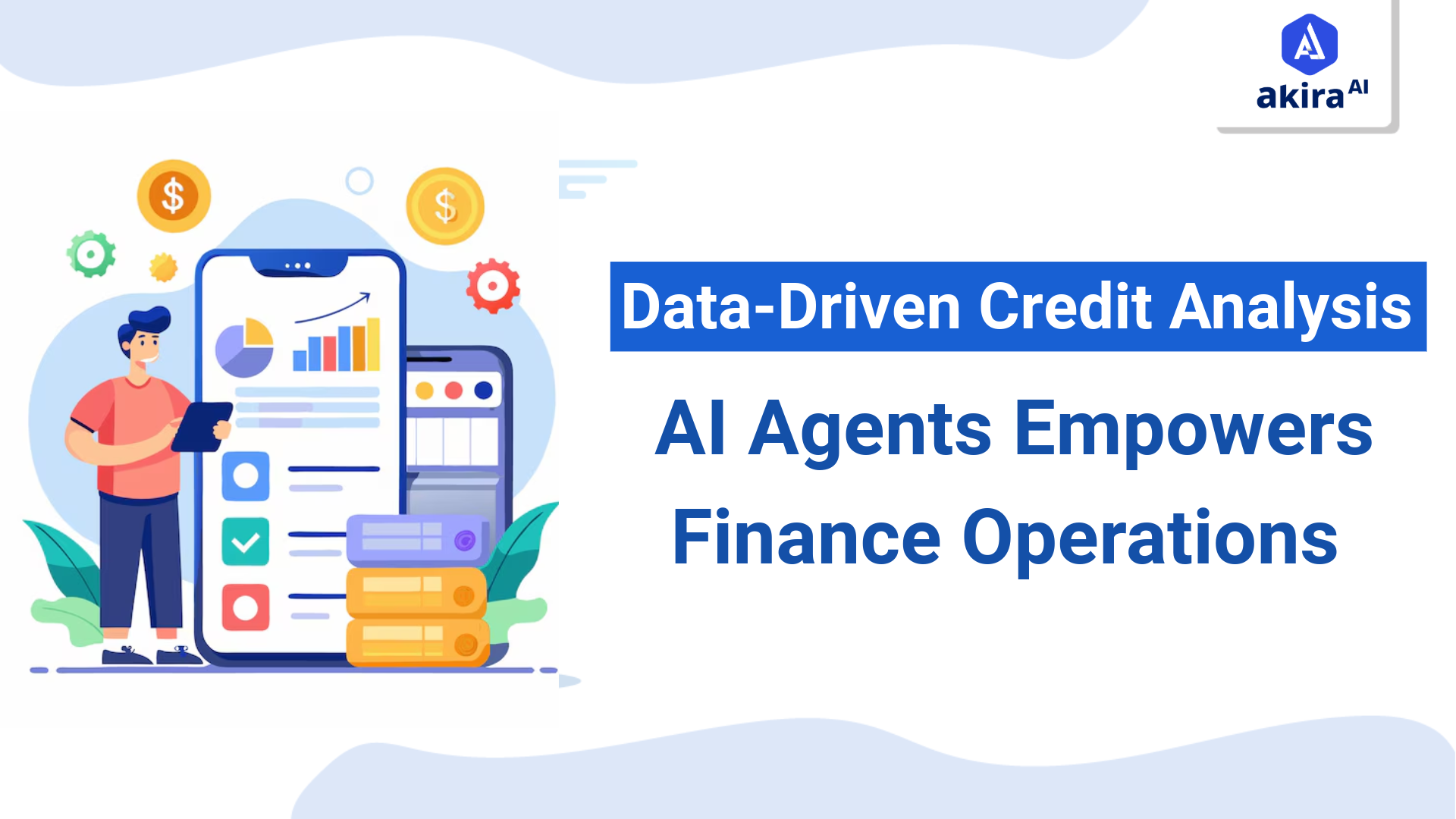Key Insights
With autonomous agents in accounting, financial institutions can access real-time data, ensuring they stay ahead of market trends. AI-driven systems handle large volumes of transactions, reducing errors and enabling faster responses to economic changes, driving better business decisions and improving the bottom line. This proactive approach to financial data allows businesses to adjust strategies more effectively and stay competitive in a rapidly evolving market.

What if accounting in the finance sector could be completely automated? This possibility is a reality with autonomous agents. These technologies are changing how financial organizations work by simplifying data entry automation while granting real-time financial analytics. The power of agentic AI in accounting enables businesses to boost efficiency, enhance accuracy, and streamline processes. By adopting these agents for accounting, companies can unlock new levels of scalability and performance, enabling them to adapt quickly to an ever-changing financial terrain. Integrating these technologies is a way to have an edge in the market and help sustain growth in an industry that is already becoming more automated.
What is Accounting in Financial Services?
Accounting in financial services involves managing financial transactions, ensuring legal compliance, and providing insights that aid in decision-making. It includes tasks such as financial analysis, reporting, auditing, and financial forecasting. As financial operations grow more complex, autonomous agents powered by AI are streamlining these processes, improving accuracy and increasing efficiency. Advanced data entry automation technology and the use of financial reporting help the institution to come up with informed decisions, thus outweighing the operational pitfalls leading to financial institutions' competence in the marketplace.
A Brief Overview of Automated Accounting in Financial Services
Automated accounting involves the use of AI agents and advanced technologies to manage a business's financial operations. These agents employ machine learning algorithms to perform tasks such as real-time financial analysis, ensuring more accurate and timely results.
Autonomous agents are basically software entities that perform unique financial capacities without needing direct control from other entities, and they do this using agentic workflows. These agents are able to communicate with systems, process data, and make decisions on their own. In an agentic AI environment, these agents work together, coordinated by a master orchestrator, to achieve operational efficiency, accuracy, and compliance.
Traditional Accounting vs. Agentic AI-Based Accounting in Financial Services
|
Aspect |
Traditional Accounting |
Agentic AI-Based Accounting |
|
Process |
Manual and time-consuming |
Automated with AI agents and machine learning |
|
Data Entry |
Prone to human error |
Data entry automation with AI-driven accuracy |
|
Speed |
Slower processing time |
Real-time data processing and insights |
|
Error Reduction |
High risk of inaccuracies |
Error reduction in accounting through automation |
|
Scalability |
Limited scalability due to manual labour |
Easily scalable due to AI-powered workflows |
|
Compliance and Reporting |
Manual monitoring for compliance |
Real-time financial insights and financial reporting automation |
|
Cost Efficiency |
High operational costs |
Significant cost reduction through automation |
|
Security |
Vulnerable to fraud and errors |
AI Guardrails ensuring security and compliance |
Akira AI: Multi-Agent in Action
 Fig1: Architecture Diagram of Accounting
Fig1: Architecture Diagram of Accounting
At the core of Akira AI’s approach to autonomous accounting is a master orchestrator, which supervises and coordinates the AI agents. These agents work together to handle various financial tasks.
Agents Used by Akira AI:
-
Master Orchestrator: Acts as the central command unit, overseeing all agents, ensuring they work in sync to complete tasks efficiently and accurately, and maintaining overall system coherence.
-
Data Collection Agent: Pulls financial data from multiple sources in real-time and ensures they input the data to the reports in real-time, hence providing reliable data for instant decision-making.
-
Transaction Validation Agent: Approves each transaction in order to check whether it complies with certain laws and regulatory policies or outside of proper procedures and rules and to avoid mistakes or fraud.
-
Reconciliation Agent: Compares and matches financial records across different systems to identify and flag discrepancies, ensuring that financial statements are accurate and balanced.
-
Reporting Agent: Saves time on preparation of financial reports and distribution where they have to meet a certain set standard and be ready within a given period without fail.
-
AI Guardrails: Works across all agents to provide a secure, compliant, and error-free environment, monitoring the entire workflow to ensure that all processes adhere to legal and security standards.
Use Cases of Autonomous Agents in Accounting
-
Financial Reporting: Agentic AI generates reports in real-time, so businesses always get the most recent financial information to make decisions. Automating the financial reporting process eliminates biases and other factors that lead to the production of wrong or inaccurate reports.
-
Expense Management: These agents track and categorize business expenses, offering insights into spending patterns and identifying potential areas for cost-saving. These agents can alert companies to potential scams or objectionable spending patterns to control spending and increase the efficiency of boardroom strategies.
-
Audit and Compliance: The multi-agent systems perform audits online and in real-time, so the organizations can immediately notice anomalies to accuracy in financial reports. They ensure that all financial activities comply with relevant laws and standards, minimizing the risk of non-compliance and potential fines.
-
Cash Flow Analysis: AI systems use past data to determine trends in cash flows, making it easier for companies to predict their financial future. Because they give timely information on real-time cash flow within companies, they aid firms in making good decisions about investments and other financial plans.
-
Tax Compliance: AI-driven systems calculate taxes automatically based on real-time financial data so that all tax obligations are met accurately and on time. They can deal with the filing process to ensure that the taxes are submitted on time minimize the chances for supplementary fines and fulfill the legal requirements of taxation.
-
Fraud Detection: These agents continuously monitor transactions in real-time, identifying any suspicious activities or potential fraud based on patterns and anomalies. They use machine learning to detect unusual behaviors that could indicate fraud, providing a more effective and timely approach than traditional methods.
Operational Benefits of Accounting in Financial Services with Agentic AI
-
Cost-Effective Operations Through Automation: By automating routine tasks such as data entry automation and financial reporting automation, businesses can significantly reduce the cost of accounting operations. It’s predicted that autonomous agents will be driving 80% of the work by 2025, leading to significant cost savings.
-
Minimized Errors and Inaccuracies: One of the key advantages of AI in accounting is the reduction of human error. Error reduction in accounting can improve the accuracy of financial records and prevent costly mistakes, leading to better decision-making. Companies have reported a 25% improvement in error reduction.
-
Scalable Financial Processes: AI agents for accounting make scaling operations easier by automating processes that would otherwise require additional manual labor. This enables firms to grow without proportionally increasing accounts.
-
Real-Time Financial Insights: Real-time financial insights provided by AI agents help businesses stay agile. By receiving up-to-date data on financial health, businesses can make quicker, more informed decisions.
-
Compliance with Regulations: AI Guardrails integrated into autonomous accounting systems help ensure compliance with regulatory requirements, reducing the risk of fines and penalties.
Technologies Transforming Accounting in Financial Services
-
Machine Learning in Finance: AI systems are capable of continuously learning and adapting to new data, improving their accuracy and predictive capabilities as they process more financial information over time. This makes them more effective in handling dynamic financial environments.
-
Natural Language Processing (NLP): NLP helps AI agents understand the different forms of data, such as invoices, contracts, and emails. Such capability helps eliminate lengthy processes of data extraction and manual data entry, which are time-consuming and hence improve operational effectiveness.
-
Cloud-Based AI Solutions: Cloud technologies provide mobility and availability of working with accounting tools both from the office and on the road, improve collaboration among the teams, and guarantee the efficiency of interrelated departments.
-
Blockchain Technology: By leveraging blockchain, agentic AI ensures secure, transparent, and tamper-proof financial transactions. This technology also supports real-time reporting and auditing, adding a layer of security and integrity to financial data management.
The Future Trends of Automated Accounting in Financial Services
-
Achieving Unmatched Precision with AI: Ongoing advancements in machine learning will significantly reduce human error in financial tasks. This improved accuracy will help businesses rely more on agentic AI for precise data entry, analysis, and decision-making, driving operational excellence.
-
Empowering Timely Decisions Through Real-Time Reporting: The multi-agent systems will provide continuous, real-time access to financial data, empowering businesses with up-to-the-minute insights. This will enable companies to make faster, more informed decisions, ultimately enhancing their competitive edge.
-
AI-driven Financial Compliance: As financial regulations grow increasingly complex, autonomous agents will play a crucial role in ensuring businesses meet compliance standards. AI systems will help automate regulatory processes, reducing the risk of violations and penalties.
-
Seamless Integration with Business Systems: AI agents will integrate effortlessly with other business systems, such as CRM and ERP, enhancing overall operational efficiency. This integration will streamline workflows, creating a more interconnected and productive environment across the organization.
Conclusion: Accounting in Financial Services with Agentic AI
The shift toward autonomous agents in accounting marks a major turning point for the finance sector. By leveraging AI agents for accounting, businesses can automate many routine tasks, such as data entry automation and financial reporting automation, unlocking vast efficiency improvements. Agentic AI enhances workflows, providing real-time financial insights that support faster, more informed decision-making. With these advancements, financial institutions can reduce operational costs, improve accuracy, and free up human resources for higher-value tasks. Embracing autonomous accounting is not just a trend—it’s a strategic move for staying competitive in an increasingly AI-driven world.


